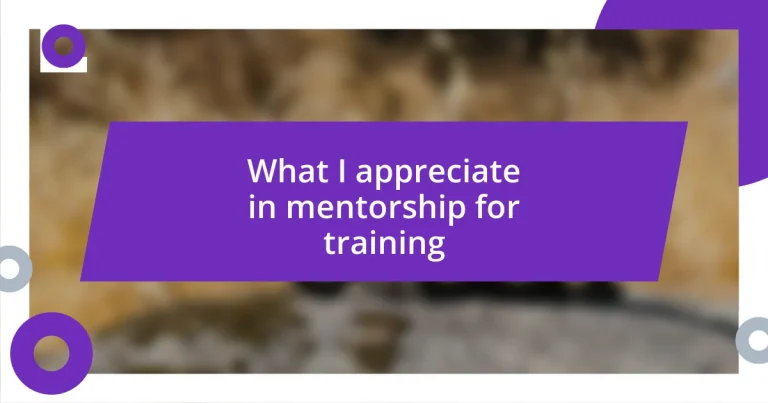Key takeaways:
- Mentorship fosters personal growth by encouraging stepping outside comfort zones, leading to the discovery of strengths and resilience.
- Key qualities of effective mentors include empathy, experience, and a genuine passion for mentee development, which enhance trust and guidance.
- Clear goal-setting and open communication are essential for building strong mentorship relationships, fostering accountability, and encouraging constructive feedback for growth.
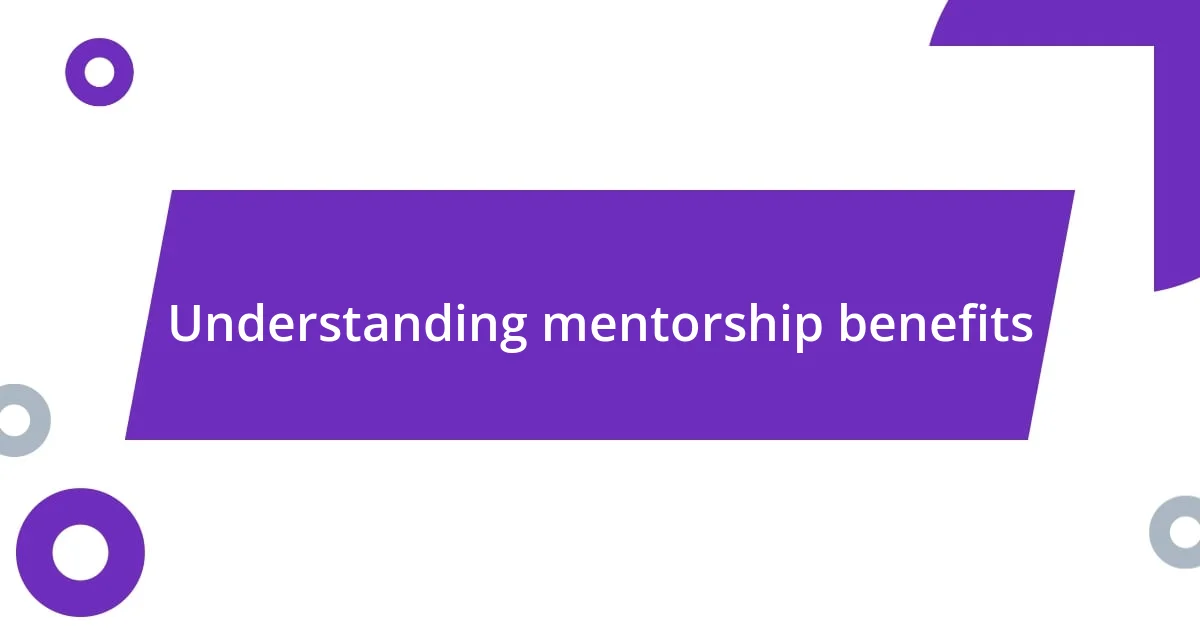
Understanding mentorship benefits
Mentorship offers invaluable support, especially when navigating complex career landscapes. I remember my first mentor who not only guided me through challenging projects but also believed in my potential when I doubted myself. Isn’t it incredible how a few encouraging words can ignite a spark and propel us forward?
One of the most profound benefits of mentorship is the opportunity for personal growth. Through my journey, I’ve had mentors who pushed me to step outside my comfort zone, reminding me that true learning happens in moments of discomfort. Have you ever experienced that growth that comes from grappling with challenges? It’s in those moments that I truly discovered my strengths and resilience.
Additionally, mentorship fosters a rich exchange of knowledge and experiences, something I’ve found to be incredibly enriching. When my mentor shared stories from their own career missteps, it wasn’t just about avoiding my pitfalls; it was a powerful reminder that failure is often a stepping stone to success. Don’t you think that learning from someone else’s experiences can save us both time and heartache?
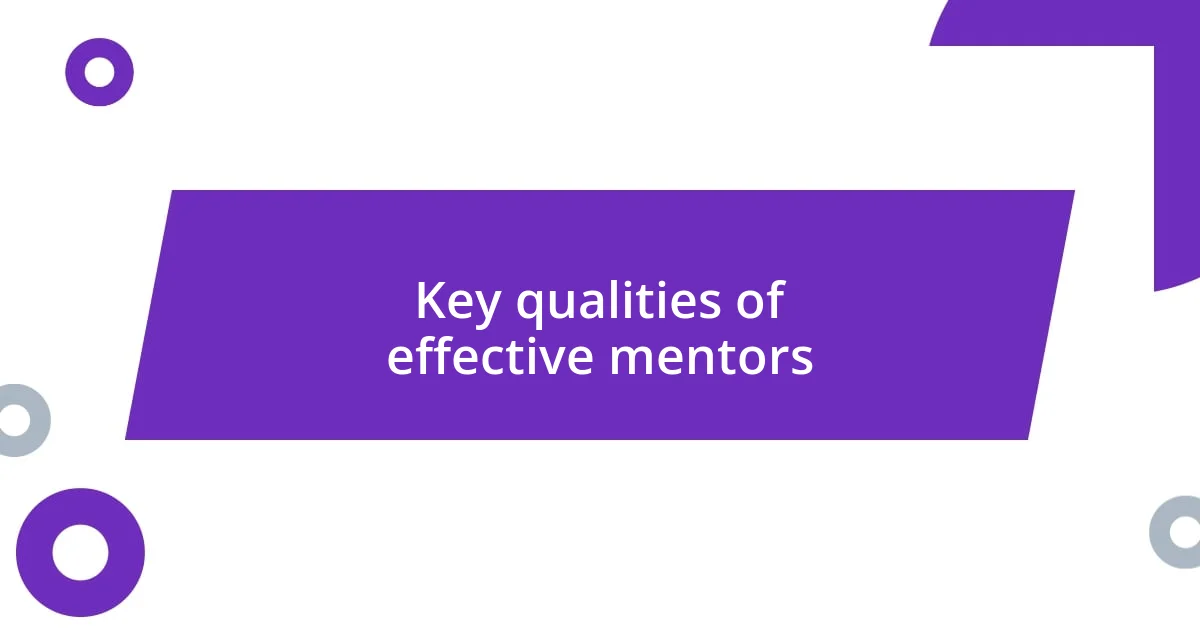
Key qualities of effective mentors
Effective mentors encompass several key qualities that contribute to a successful relationship. Empathy stands out as a paramount trait; I remember a particular mentor who always took the time to understand my frustrations and fears. Their ability to truly connect with my feelings made our conversations feel safe and productive, fostering a nurturing environment. Have you experienced a mentor who listened to your worries and offered thoughtful feedback?
Another crucial quality is experience. My mentors have shared invaluable lessons learned over years of practice, offering practical insights that complemented my academic knowledge. For instance, one mentor’s approach to negotiation transformed my perspective entirely, enabling me to navigate corporate environments with confidence. It’s remarkable how experience shapes a mentor’s ability to guide effectively.
Lastly, effective mentors possess a genuine passion for helping others grow. I recall a mentor who dedicated extra hours just to brainstorm ideas with me, illustrating their commitment to my development. It was evident that their desire to see me succeed was not just a duty, but something they truly cherished. Don’t you think that a mentor’s enthusiasm can significantly enhance our learning journey?
| Quality | Description |
|---|---|
| Empathy | Ability to connect and understand the mentee’s feelings. |
| Experience | Depth of knowledge gained through personal career challenges and successes. |
| Passion for Mentoring | Genuine dedication to the growth and success of the mentee. |
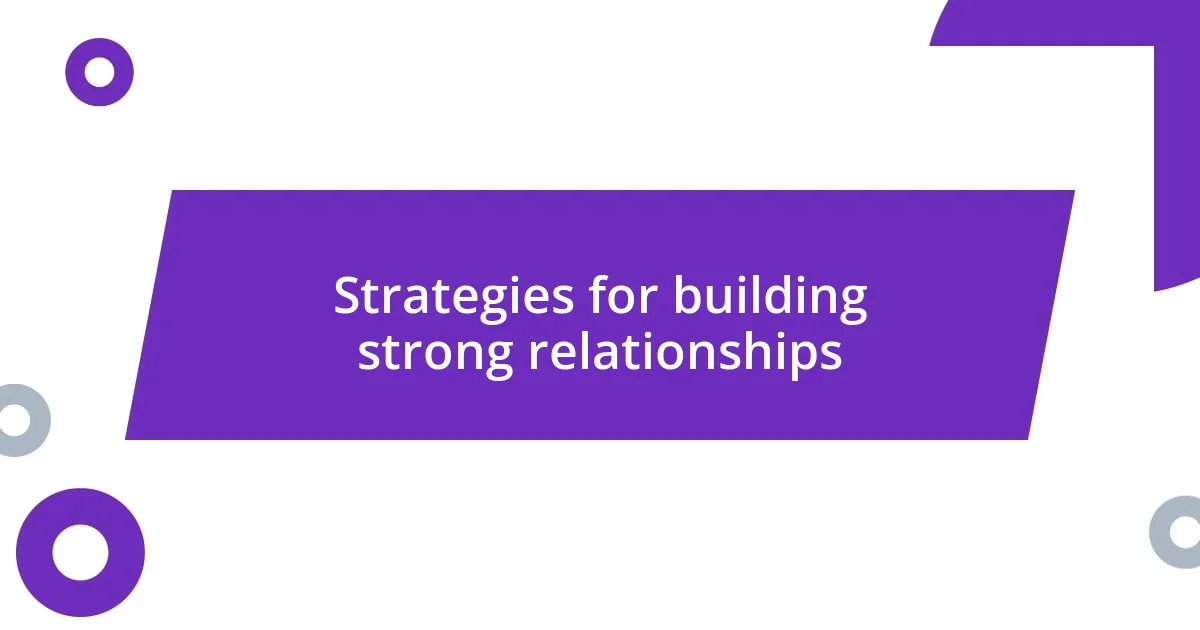
Strategies for building strong relationships
Building strong relationships in mentorship requires intentional effort and a genuine connection. I’ve always valued open communication; it establishes trust and allows both parties to express thoughts freely. I recall a mentor who encouraged me to ask questions, no matter how trivial they seemed. This practice transformed our dynamic. I felt respected and empowered, knowing my voice mattered.
To foster such relationships, consider the following strategies:
- Regular Check-ins: Establish routine meetings to discuss progress and challenges. Consistency reinforces commitment.
- Active Listening: Truly hear your mentee’s concerns and aspirations, mirroring their feelings. It cultivates a supportive atmosphere.
- Shared Goals: Collaborate on specific objectives that benefit both mentor and mentee, creating a sense of partnership.
- Celebrate Milestones: Acknowledge achievements, big or small, to inspire motivation and strengthen your bond.
- Be Vulnerable: Share your own experiences, including failures, to humanize the relationship and build rapport.
Investing in these strategies can significantly enhance the mentorship experience, nurturing a meaningful connection that thrives over time.
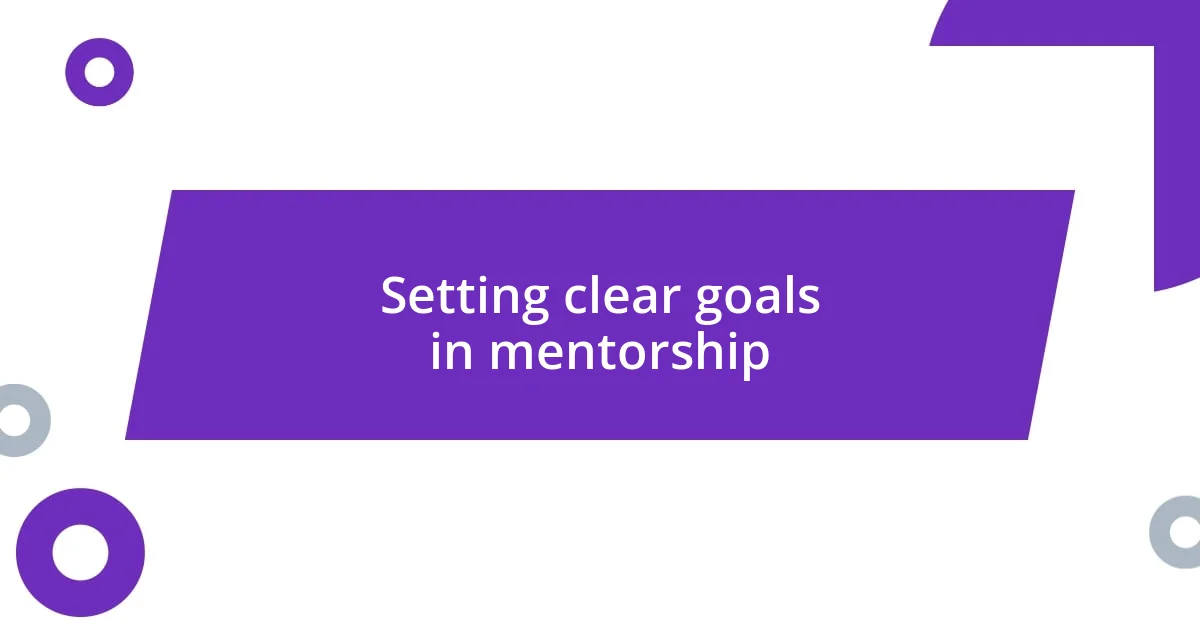
Setting clear goals in mentorship
When it comes to mentorship, setting clear goals is essential for navigating the journey together. I’ve found that without defined objectives, the mentoring relationship can feel aimless and frustrating. For instance, I once entered a mentorship without explicit goals, and it left me feeling lost. Have you ever experienced that sense of drifting? The clarity of shared goals helped ground the relationship and made our time together much more productive.
Establishing goals also provides a roadmap for both the mentor and mentee. I recall when I worked with a mentor on specific communication skills. We set measurable targets, such as presenting in front of small groups and receiving feedback afterward. Each achievement, no matter how minor, ignited motivation within me, reinforcing our journey toward the ultimate goal. Isn’t it amazing how setting benchmarks can elevate our efforts and keep us focused?
Moreover, revisiting these goals regularly instills a sense of accountability. I remember a mentor who would often check in on my progress, gently reminding me of our targets. It kept me engaged and ensured that I wasn’t just coasting along. This dynamic also fostered conversations about any obstacles I faced—an opportunity for growth that we could tackle together. If you’ve ever had a mentor who checked in with you, you know how powerful that can be in maintaining momentum.
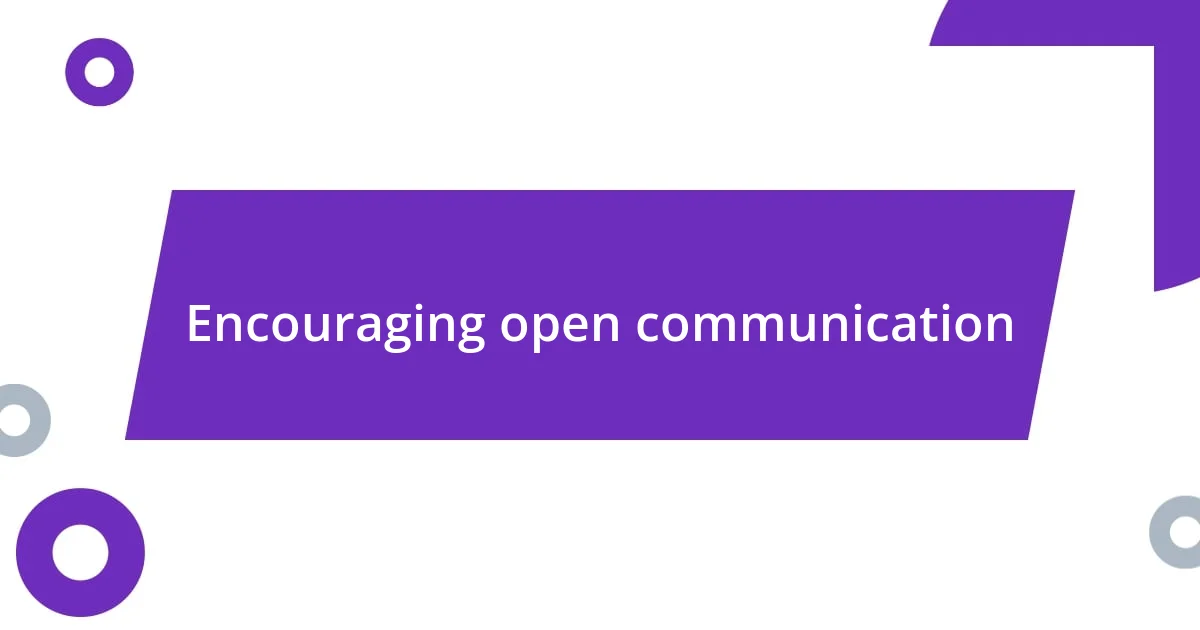
Encouraging open communication
Encouraging open communication is a cornerstone of effective mentorship. I remember a time when my mentor openly shared their experiences with setbacks. This vulnerability created a safe space for me to voice my own fears and uncertainties. Have you ever felt hesitant to speak up? When I was encouraged to share my thoughts, I realized that I wasn’t alone in my struggles, and that realization strengthened our rapport immensely.
I’ve found that actively inviting questions fosters a healthy dialogue. There was a particular moment when I was grappling with a challenging project. Instead of waiting for me to approach them, my mentor prompted me directly: “What’s on your mind?” That simple invitation made all the difference, allowing me to articulate my concerns without hesitation. I can’t stress enough how powerful it is when mentors cultivate that inviting atmosphere.
Moreover, giving and receiving feedback is crucial in this process. I vividly recall a time when my mentor offered constructive criticism on my presentation style. Initially, I felt defensive, but then I appreciated the opportunity to improve. The back-and-forth communication not only honed my skills, but it also deepened my trust in my mentor. Wouldn’t you agree that open dialogue not only improves performance but also enriches the relationships we build?
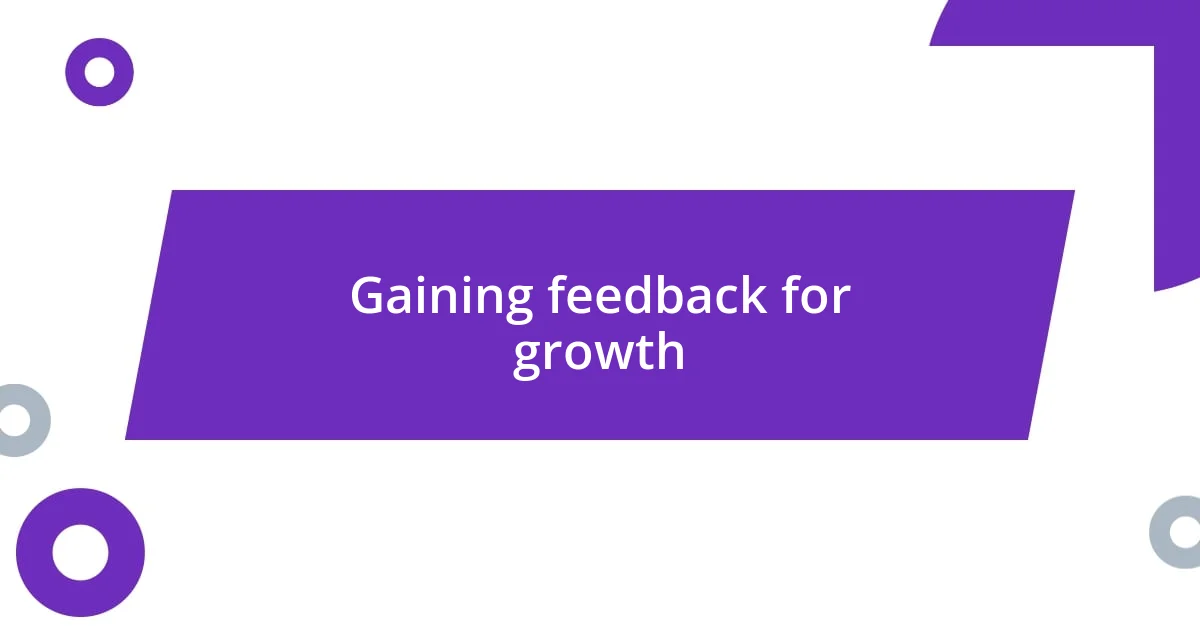
Gaining feedback for growth
Gaining feedback is an invaluable part of the mentorship journey. I recall one particular instance when my mentor provided feedback on a project I was passionate about. Initially, I was anxious about criticism, but my mentor offered insights that really opened my eyes. It was like uncovering a new layer of understanding; have you ever had a moment when feedback flipped your perspective? The encouraging way that feedback was delivered made me more receptive, transforming potential defensiveness into excitement for growth.
Another time, I remember asking my mentor for feedback after a presentation. They took the time to reflect not just on what I had done well, but also on areas needing improvement. Hearing their thoughts while I was still processing my own feelings about the presentation was enlightening. Instead of feeling defeated, I left that conversation feeling more empowered and eager to refine my skills. It struck me how valuable it is to see feedback not as judgment, but as a tool for evolution. Don’t you think it helps to have someone in your corner offering insights that push you forward?
Developing a feedback-rich environment has been a game-changer in my experience. I had a mentor who regularly invited my ideas and reactions to the feedback they provided, creating a dialogue rather than a monologue. This collaborative approach allowed me to process the information actively. The more our conversations flowed, the more I felt I could be transparent about my challenges. Have you experienced this kind of partnership in mentorship? It’s remarkable how shared insights can transform simple feedback into profound avenues for personal and professional growth.
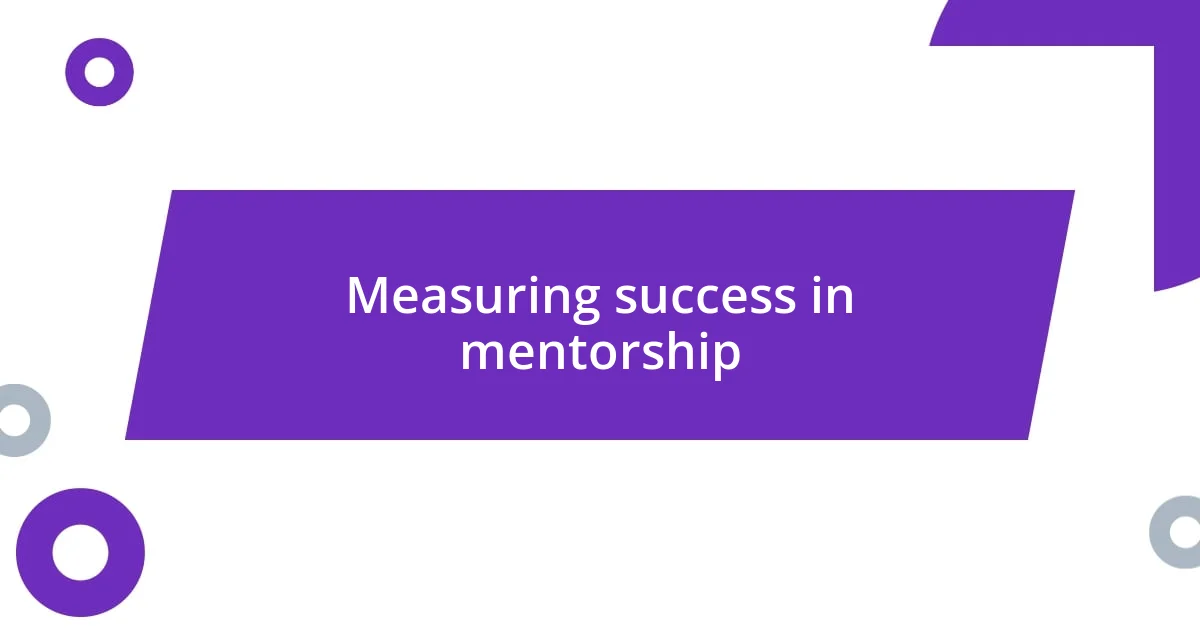
Measuring success in mentorship
Success in mentorship can often be gauged through the tangible growth of the mentee. For instance, I can recall the moment I took on a leadership role in a project due to the confidence my mentor instilled in me. That step not only marked a pivotal change in my career but also reflected the trust and skills built over our mentoring sessions. Have you ever experienced a moment where you felt ready to leap into a challenge, thanks to someone else’s belief in you? That leap is often a significant marker of success.
Another vital aspect of measuring success is the feedback loop established between mentor and mentee. On one occasion, after presenting a proposal I was particularly excited about, I eagerly awaited my mentor’s thoughts. Rather than jumping straight into critique, they began by highlighting what resonated well. This balanced approach not only affirmed my efforts but also sparked a deeper discussion on areas for improvement. Doesn’t it feel more enriching when feedback feels like a shared journey rather than a judgment? This interplay creates a space where both parties can celebrate small victories, fostering a lasting impact.
Ultimately, I’ve found that the emotional connection built during mentorship is an essential measure of success. When my mentor recognized not just my professional milestones but also acknowledged my personal struggles, it made our relationship feel genuine and supportive. This recognition fueled my determination to push boundaries, knowing there was someone rooting for me. Can you think of a time when an emotional bond enhanced your learning experience? That connection is often a crucial indicator that mentorship is thriving, leading to meaningful, impactful development.












